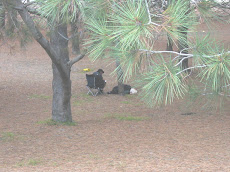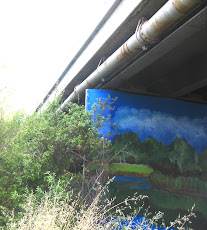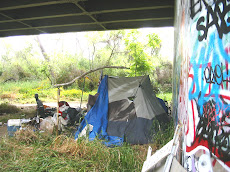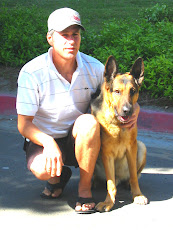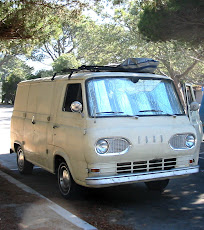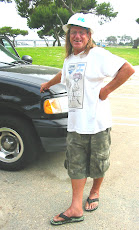For a long time, the Department of Motor Vehicles (DMV) has wanted a national system connecting all the States in a compact to make it easier to find persons who have committed vehicular crimes. The new Office of Homeland Security, through its legislation known as the Patriot Act, created just such a structure, though its purpose was framed in the language of chasing international terrorists with cells in the United States.
The Problem Driver Pointer System (PDPS) is a list of names of all American citizens who have ever had a traffic violation for which the fine is unpaid, and my name is on it. Little is known about the PDPS, so there may be other reasons why there are names on a list; and, indeed, there may be other lists; but it all seems to have little to do with terrorists. The PDPS is operated by the DMV, but it is part of the command structure of Homeland Security, making it impossible to find anyone who has authority and who is ultimately responsible. I do mean impossible.
I know this because I spent six months researching ways to retrieve my California driver's license without paying that 20-year-old traffic fine, for which reason, purportedly, my name is on the PDPS. I never did manage to speak to anyone where PDPS decisions are made, wherever that is.
Six months earlier, having finally resolved a mound of debt with the DMV, I went in to the local office to pick up my driver's license which had been confiscated. (More on that later). After an hour, my number came up on the big board, and I skipped to the appropriate window, holding back a "Yippee!" I had just been released from driver/debtor prison and was about to be restored to legal-driver status.
"Uh . . . let me see . . . you have an unpaid ticket on your record," the clerk remarked as she scrolled slowly through several screens on her computer. "We are going to have to keep your license until it is cleared."
"Wha-a-a-t? That can't be. My record was just cleared," I said in disbelief. A wave of gloom and hopelessness swept over me. I had been struggling for months to clear my DMV record, and I thought I was at the finish line.
"This ticket is in Iowa, and you will have to call Illinois about it. I'll get you the information." The clerk handed me a print-out of a suspension notice. Until this moment, I had completely forgotten about the incident, though the memory is vague. I remember being ticketed, but all the details escape me.
I was a campaign worker in the winter of 1988, a visitor from Illinois in Iowa, and I was driving two-lane highways in rural counties in a rental car. I am guessing that when I passed through the little town of Montezuma, I failed to reduce my speed. Maybe I did not even see that little town. (The 2000 census puts Montezuma's population at 1400.) In any case, I am sure I didn't kill anyone. There was no hit-and-run, though that patrol officer could be dead by now. The Illinois Senator for whom I worked is no longer with us. Twenty years ago, mind you.
"That was twenty years ago!" I was exasperated by this turn of luck. "Isn't there a statute of limitations?"
"Not with the new system there isn't. You're not the only one. Everybody is getting these old tickets, and the best thing to do is pay it." The clerk looked like she knew what she was talking about, but I still didn't like the answer. Sure, I probably was speeding and, with the hectic life of a campaign, just never got home to pick up the mail. From Iowa, I had gone on to several other States.
But it was not the ticket that bothered me: it was the lack of forgiveness, which is unamerican.
My quest for pardon began with a call to the Illinois Secretary of State Traffic Violations Section. They said they would look up my suspension and send me the requisite information, which turned out to be a form letter stating that once I satisfied the ticket in Iowa, I would then need to pay Illinois a reinstatement fee of $70. I called that office back to ask if there were any mercy for homeless people. Mercifully, I suppose, I was told that if Iowa dismissed the ticket, then I would not have to pay the Illinois fee.
So, next, I phoned the Poweshiek County Clerk's office in Montezuma, Iowa. I explained my situation, that I was homeless, and wondered if there were any pardon for the 20-year-old traffic fine on the basis of hardship. I should write a letter to the magistrate, I was told, and he would render a decision by mail.
Several weeks passed before I received an answer to my letter. It was a few words scribbled on an official form to this effect: the Court had no authority to set aside my ticket or the fine. Surprised and upset, I called the Poweshiek County Clerk's office immediately. I wanted to speak to the magistrate, I told the clerk; but he is only in on Thursdays, she said, and I would have to call before 9 a.m. Central Time, before Court began.
Nearly a week later, on the following Thursday, I was up at 5:30 a.m., Pacific Time. Anxious and wanting to be alert for the phone call, I tossed down breakfast and had my first morning cup. There was no answer on the first call, presumably because the clerk was not in yet. On the second call, the clerk's office was open, but the magistrate was not in. It took another call, and another, but I reached the magistrate.
Too self-conscious to repeat what I had written in my letter, I got right to the point: how could a judge not have jurisdiction in his own court? That was hard to believe. After all, it was only a speeding ticket, and it was a very old one, at that. The magistrate was apologetic, but, indeed, there was nothing in the law that gave him authority to dismiss the ticket.
"Well, who does have the authority?"
"Maybe the Governor?" I thought he was joking for a moment, but he seemed genuinely not to know for sure. Good enough for me. I was back on the trail and calling Governor Chet Culver's office within minutes. I was promptly sent to one of the Governor's assistants who took my information and gave me the phone number of the point person on driver's issues. I was handled expertly by this woman who even emailed me with updates. I did not want a pardon from the Governor, she explained, because that would take, at least, two years. Rather, she found someone to help me in the Iowa Department of Transportation (IDOT).
It was all downhill from there.
Plenty of emails and phone calls passed; but, in the end, there was nothing IDOT could do for me. Their suggestion? Go back to the magistrate of Poweshiek County.
"You're kidding." It made no sense, but clearly this IDOT employee had no idea where to send me. The setback dampened my enthusiasm for the quest, but there was more to come. It was only the first circle of going around in circles.
For want of a better idea, I phoned the Poweshiek County Clerk's office again. I told the clerk, flat out, that I had been sent back to her office. She said I could try speaking to the magistrate again, but, suddenly, I had a better idea. I phoned the county legal service and asked for help with my old ticket. I wondered if someone there could represent me, at a distance, in the magistrate court in Poweshiek. That office sent me to the County Attorney who was brusque and lunged irascibly at everything I said. He thought I was out of my mind and hung up on me.
But I remembered the County Attorney saying I should be speaking to the motor vehicle people in California, since that is where I currently held a license. I latched onto that piece of wreckage, like a floating spar, as I now found myself desperate for help from some quarter. I called the California DMV. They sent me back to Iowa.
"Do you have any other ideas, other than Iowa?" I was tired and disheartened, but not yet demoralized: that would have to wait for the go-round with staffers to California elected officials, which was the DMV employee's next suggestion.
I called my State senator and representative, neither of whom had anyone in their office familiar with the PDPS. I explained, seemingly, over and over, about the PDPS and what I found offensive about it. Everyone to whom I spoke sounded young, too young and too poorly educated to be working for a California political player who represented, primarily, Baby Boomers.
One of those whippersnappers told me just to pay the fine: "Well, you did break the law, didn't you?"
See what I mean? What would he know about creeping fascism, which has been creeping for decades, at least, since Richard Nixon was in office? What would he know about taking it to the streets or any other form of civil disobedience to which Americans have a right? I wanted to reach out and slap somebody. Instead, I gave the young man a listen-to-me-Sonny piece of my mind. Not that it did any good. He hung up on me.
Another such staffer accused me of expecting his office to commit an ethical breach, what he called "influence," when I merely wanted someone there in that elected official's office to do something, make a phone call or two on behalf of a constituent, as it was my assumption that they worked for me, for the public, and should be able to unravel tangles like the one I was in.
Again, I got nowhere at all, but the more resistance, the more emboldened I had become. I struggled on and phoned my U.S. Congressperson and a U.S. Senator whose offices, I was told, did not handle DMV matters and somehow also seemed unaware of the linkage between the DMV and Homeland Security. I was not in America any more, not the one for which I used to protest, but the new America of the after-school daycare cohort.
With no one left with whom to speak, with no help forthcoming, I called the PDPS office myself. I had nothing to lose, but I was not ready to admit that we now have a whole new set of laws with limitless reach that place all Americans under suspicion.
Phil answered the phone. For the first time in my search, I seemed to be talking to someone who understood my point of view. He was candid about the purpose of the PDPS, which was not to fight terrorism. He asked how I learned of the old traffic violation. I explained about my visit to the local DMV. Phil said he thought he might be able to get me off on a technicality since PDPS notices were usually sent by mail. I was not sure what kind of difference that might make, but Phil felt I had a slight chance. In any case, he would bump my case upstairs, that is, to the people in Homeland Security. I was to phone him back in a month.
Visions of a final victory over the evil of the twenty-year-old traffic ticket carried me through the next month. I was ready to feel vindicated and to have a reason to call those public officials' offices back and that madman attorney in Iowa. I would harangue them from my high horse.
All to no avail.
When I called Phil again at the PDPS office, there had been no response from on high, which meant nothing had happened, nor would anything likely happen in the future, to change the disposition of the old traffic ticket. It did not matter that I had been a good driver in California for twenty years; that counted for nothing. I was a problem driver now, unless and until I paid the penalties in both States of Iowa and Illinois.
Defeated, I retreated across the Rappahannock again, this time never to return to the matter. I spent a few days binding my wounds, then did the gracious thing of phoning the Poweshiek County Clerk. I would be sending a money order for the old traffic fine, I told her, and would she please send back a letter of release for the State of Illinois. She seemed please to hear from me, as though I had been through a spell of prodigality and waywardness, sure to return to the fold.
Her sort of old-fashioned faith was very American, no matter what else has happened to our country.
How to Wash a Weighted Blanket at Home
-
That comforting weight pressing down as you drift to sleep has become
essential—but after months of nightly use, your weighted […]





